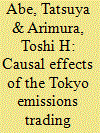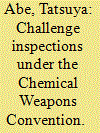| Srl | Item |
| 1 |
ID:
186483


|
|
|
|
|
| Summary/Abstract |
The Tokyo emissions trading scheme (ETS) is the first regional ETS in Japan, where a national ETS has not been introduced. In this study, we estimate the policy impacts of the Tokyo ETS on energy usage and economic activities during the scheme’s first phase (2010–2014) and the first four years of its second phase (2015–2018) using business establishment-level panel data from 2007 to 2018. From the matching-based difference-in-differences (DID) estimation results, we find that while regulated business establishments reduced their energy usage beyond their reduction targets set by ETS regulation, the unregulated business establishments chosen by the matching strategy as a comparison group also decreased their energy usage to the same extent. Additionally, the Tokyo ETS did not have a negative impact on the economic activities of regulated business establishments during phases I and II. These results suggest that the emissions cap levels in each phase may not have been sufficiently demanding to induce regulated business establishments to implement additional energy use reduction practices.
|
|
|
|
|
|
|
|
|
|
|
|
|
|
|
|
| 2 |
ID:
156591


|
|
|
|
|
| Summary/Abstract |
The challenge-inspection system under the 1997 Chemical Weapons Convention has been regarded as an “epoch-making” procedure. Any state party can request a challenge inspection “anytime, anywhere, without right of refusal.” Yet, despite its high value in theory, no challenge inspection has yet been requested. There are legal, political, and other reasons that account for the absence of any such request. However, in the context of Syria's chemical weapons, several ad hoc measures have been taken that could be considered alternative to the challenge-inspection system. These developments have implications, largely negative, for that system. It is likely that ad hoc alternative measures will be employed in the future, though their use will depend on the situation. Although the challenge-inspection system may not be employed in the future, its theoretical availability remains and contributes to the prevention of noncompliance to a certain extent.
|
|
|
|
|
|
|
|
|
|
|
|
|
|
|
|